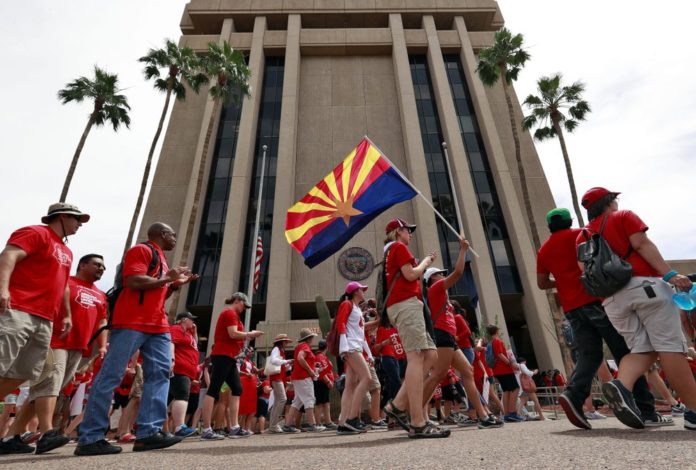
Arizona voters have approved a new tax on high-earning residents that could bring in nearly $1 billion of new revenue annually to the state’s underfunded school system.
The approval of Proposition 208 came after the state’s business community spent millions trying to defeat the measure backed by many educators and progressive groups. They argued it would hurt the state’s economy.
“By voting Yes on 208, Arizona voters made it loud and clear they want teachers to be compensated properly and have the resources needed to successfully educate their students,” said Joe Thomas, President of the Arizona Education Association, the state’s largest teachers union.
Approval of the tax is a repudiation of Republican Gov. Doug Ducey and GOP conservatives who control the Legislature. They have refused to change the state’s tough marijuana laws and been unable to fully restore education funding cut after the Great Recession.
The Invest in Education Act will impose an extra 3.5% tax on income above $250,000 for individuals and for couples making more than $500,000. Supporters have said it could raise about $940 million yearly.
The measure was an outgrowth of a 2018 teacher strike that gave teachers a 20% percent pay raise over three years but fell short of what strikers demanded.
They also wanted guaranteed pay raises, more money for support staff, and a halt to Republican-backed tax cuts until Arizona school funding reached the national average.
Arizona’s K-12 public schools have been strapped for cash for more than a decade and have struggled to educate their 1.1 million students. Classes routinely have 30 students or more.
GOP House Speaker Rusty Bowers on Thursday said the fallout from the passage of both the tax measure and a measure legalizing recreational marijuana would be immense for the state’s economy.
“The companies are going to say, ‘If you are going to start taxing me more for being successful and giving people jobs, and if you’re going to make my workforce … where I can’t guarantee safety, I’ll go somewhere else.’ They can move.”
Supporters of the measure dispute warnings about economic fallout, saying employers want to see quality schools and a well-educated workforce.
Republished with the permission of the Associated Press.












